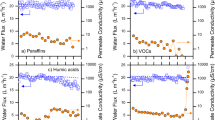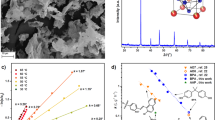Abstract
This study has the novel aim of experimentally examining the efficiency of a pilot-scale treatment plant, composed of a multi-tube type falling-film distillation column equipped with a biphasic thermosiphon, for treating a real sample of high-salinity produced water (electrical conductivity of 20,700 μS cm−1). It investigates the influence of operational parameters, including feed temperature and steam chamber temperature of the biphasic thermosiphon, on distillate flow rate and reduction of conductivity. All experimental conditions tested achieved a reduction greater than 98% in terms of electrical conductivity. The production of treated water increased with increasing feed temperature; the flow rate increased from 20.8 L h−1 to 28.2 L h−1 as the feed temperature was increased from 80 °C to 90 °C, when the steam chamber temperature was fixed at 119 °C. Within the temperature range of the steam chamber, the specific energy consumption during the treatment process, with respect to the biphasic thermosiphon, remained practically unchanged between 0.58 kWh L−1 and 0.60 kWh L−1, when the feed temperature was 90 °C. The results proved the potential of the falling-film distillation technology assisted by heat pipes to be a promising proposal for removing salinity from produced water from oil extraction operations.






Similar content being viewed by others
Data availability
The datasets utilized and/or analyzed in the current study can be made available by the corresponding author upon a reasonable request.
References
Alves JLF, da Silva Filho VF, Machado RAF, Marangoni C (2020) Ethanol enrichment from an aqueous stream using an innovative multi-tube falling film distillation column equipped with a biphasic thermosiphon. Process Saf Environ Prot 139:69–75. https://doi.org/10.1016/j.psep.2020.03.039
Alves JLF, Machado RAF, Marangoni C (2023) Insights into the startup operation of a thermally efficient multi-tube falling-film distillation column. Chem Eng Process - Process Intensif 191:109471. https://doi.org/10.1016/j.cep.2023.109471
Battisti R, Claumann CA, Manenti F et al (2021) Machine learning modeling and genetic algorithm-based optimization of a novel pilot-scale thermosyphon-assisted falling film distillation unit. Sep Purif Technol 259:118122. https://doi.org/10.1016/j.seppur.2020.118122
Battisti R, Machado RAF, Marangoni C (2020) A background review on falling film distillation in wetted-wall columns: from fundamentals towards intensified technologies. Chem Eng Process - Process Intensif 150:107873. https://doi.org/10.1016/j.cep.2020.107873
da Silva Filho VF, Alves JLF, Reus GF et al (2018) Experimental evaluation of the separation of aromatic compounds using falling film distillation on a pilot scale. Chem Eng Process - Process Intensif 130:296–308. https://doi.org/10.1016/j.cep.2018.06.026
Elhenawy Y, Moustafa GH, Attia AM et al (2022) Performance enhancement of a hybrid multi effect evaporation/membrane distillation system driven by solar energy for desalination. J Environ Chem Eng 10:108855. https://doi.org/10.1016/j.jece.2022.108855
Elmarghany MR, El-Shazly AH, Salem MS et al (2019) Thermal analysis evaluation of direct contact membrane distillation system. Case Stud Therm Eng 13:100377. https://doi.org/10.1016/j.csite.2018.100377
Ghafoori S, Omar M, Koutahzadeh N et al (2022) New advancements, challenges, and future needs on treatment of oilfield produced water: a state-of-the-art review. Sep Purif Technol 289:120652. https://doi.org/10.1016/j.seppur.2022.120652
Han F, Bian Y, Zhang C (2022) Conductive heating vacuum membrane distillation for brine desalination: study on operational conditions, temperature polarization and energy consumption. Desalination 531:115726. https://doi.org/10.1016/j.desal.2022.115726
Huang Z, He X, Nye C et al (2021) Effective anaerobic treatment of produced water from petroleum production using an anaerobic digestion inoculum from a brewery wastewater treatment facility. J Hazard Mater 407:124348. https://doi.org/10.1016/j.jhazmat.2020.124348
Jiménez S, Micó MM, Arnaldos M et al (2018) State of the art of produced water treatment. Chemosphere 192:186–208. https://doi.org/10.1016/j.chemosphere.2017.10.139
Kim J, Kim J, Hong S (2018) Recovery of water and minerals from shale gas produced water by membrane distillation crystallization. Water Res 129:447–459. https://doi.org/10.1016/j.watres.2017.11.017
Marangoni C, Meneguelo AP, Teleken JG et al (2019) Falling film distillation column with heat transfer by means of a vapor chamber – part I: isothermal operation. Chem Eng Commun 206:994–1005. https://doi.org/10.1080/00986445.2018.1542250
Milanez KW, Mantelli MBH, Oliveira LCM, et al (2014) Equipamento e processo de destilação com controle de energia pela demanda. Brasil. Número do registro: BR10201402976850, Instituição de registro: INPI - Instituto Nacional da Propriedade Industrial
Nyieku FE, Essandoh HMK, Armah FA, Awuah E (2022) Modelling the interaction between physico-chemical and bacteriological characteristics of oilfields produced water from a waste management facility. Clean Waste Syst 3:100054. https://doi.org/10.1016/j.clwas.2022.100054
Panagopoulos A (2022a) Brine management (saline water & wastewater effluents): Sustainable utilization and resource recovery strategy through minimal and zero liquid discharge (MLD & ZLD) desalination systems. Chem Eng Process - Process Intensif 176:108944. https://doi.org/10.1016/j.cep.2022.108944
Panagopoulos A (2022b) Techno-economic assessment and feasibility study of a zero liquid discharge (ZLD) desalination hybrid system in the Eastern Mediterranean. Chem Eng Process - Process Intensif 178:109029. https://doi.org/10.1016/j.cep.2022.109029
Panagopoulos A, Giannika V (2022a) Decarbonized and circular brine management/valorization for water & valuable resource recovery via minimal/zero liquid discharge (MLD/ZLD) strategies. J Environ Manage 324. https://doi.org/10.1016/j.jenvman.2022.116239
Panagopoulos A, Giannika V (2022b) Comparative techno-economic and environmental analysis of minimal liquid discharge (MLD) and zero liquid discharge (ZLD) desalination systems for seawater brine treatment and valorization. Sustain Energy Technol Assessments 53:102477. https://doi.org/10.1016/j.seta.2022.102477
Panagopoulos A, Giannika V (2023) Study on the water resources and the opportunities for sustainable desalination & minimal/zero liquid discharge (MLD/ZLD) practices in Greece (Eastern Mediterranean). Sustain Water Resour Manag 9:106. https://doi.org/10.1007/s40899-023-00884-5
Peruzzo T, Battisti R, Alves JLF et al (2022) Triethylene glycol recovery by an energetically intensified thermosyphon-assisted falling film distillation unit: experimental assessment on a pilot-scale unit and in-silico comparison with a conventional column from natural gas processing. Chem Eng Process - Process Intensif 176:108970. https://doi.org/10.1016/j.cep.2022.108970
Pires APB, da Silva Filho VF, Alves JLF et al (2020) Application of a new pilot-scale distillation system for monoethylene glycol recovery using an energy saving falling film distillation column. Chem Eng Res Des 153:263–275. https://doi.org/10.1016/j.cherd.2019.10.033
Ricceri F, Giagnorio M, Farinelli G et al (2019) Desalination of produced water by membrane distillation: effect of the feed components and of a pre-treatment by Fenton oxidation. Sci Rep 9:14964. https://doi.org/10.1038/s41598-019-51167-z
Ruiz-Aguirre A, Andrés-Mañas JA, Fernández-Sevilla JM, Zaragoza G (2018) Experimental characterization and optimization of multi-channel spiral wound air gap membrane distillation modules for seawater desalination. Sep Purif Technol 205:212–222. https://doi.org/10.1016/j.seppur.2018.05.044
Souza JSB, Ferreira Júnior JM, Simonelli G et al (2020) Removal of oil contents and salinity from produced water using microemulsion. J Water Process Eng 38. https://doi.org/10.1016/j.jwpe.2020.101548
Summers EK, Arafat HA, Lienhard VJH (2012) Energy efficiency comparison of single-stage membrane distillation (MD) desalination cycles in different configurations. Desalination 290:54–66. https://doi.org/10.1016/j.desal.2012.01.004
Teleken JG, Werle LO, Parisotto IGB et al (2012) Computational fluid dynamics simulation of the feed distribution system of a falling film distillation device. Computer Aided Chemical Engineering. Elsevier BV, In, pp 845–849
Funding
The authors are grateful for the financial support from Brazil National Agency for Petroleum, Natural Gas and Biofuels (ANP), the Financier of Studies and Projects (FINEP) through the Human Resources Program for the Oil, Natural Gas and Biofuels Sector (PRH-11.1/2021-ANP/MCT), and from Brazil National Council for Scientific and Technological Development (CNPq/Brazil Process 152461/2022-1).
Author information
Authors and Affiliations
Contributions
Eduardo Carpes Dib: conceptualization, methodology, investigation, formal analysis, data curation, writing—original draft. Samaira Kraus: investigation, formal analysis, data curation. Ricardo Antonio Francisco Machado: resources, project administration. José Luiz Francisco Alves: conceptualization, methodology, investigation, formal analysis, data curation, visualization, writing—review and editing, supervision. Cintia Marangoni: conceptualization, resources, supervision, project administration, writing—review and editing.
Corresponding author
Ethics declarations
Ethics approval
Not applicable.
Consent to participate
Not applicable.
Consent for publication
Not applicable.
Competing interests
The authors declare no competing interests.
Additional information
Responsible Editor: Guilherme Luiz Dotto
Publisher’s note
Springer Nature remains neutral with regard to jurisdictional claims in published maps and institutional affiliations.
Rights and permissions
Springer Nature or its licensor (e.g. a society or other partner) holds exclusive rights to this article under a publishing agreement with the author(s) or other rightsholder(s); author self-archiving of the accepted manuscript version of this article is solely governed by the terms of such publishing agreement and applicable law.
About this article
Cite this article
Dib, E.C., Kraus, S., Machado, R.A.F. et al. A novel intensified approach for treating produced water from oil extraction using a multi-tube type falling-film distillation column equipped with a biphasic thermosiphon: a promising feasibility study. Environ Sci Pollut Res 30, 95025–95034 (2023). https://doi.org/10.1007/s11356-023-29387-8
Received:
Accepted:
Published:
Issue Date:
DOI: https://doi.org/10.1007/s11356-023-29387-8




